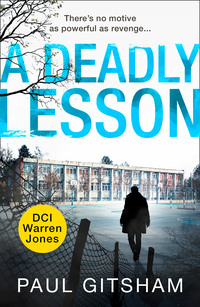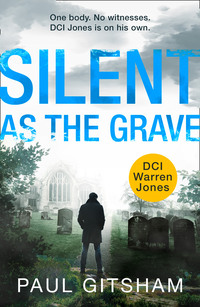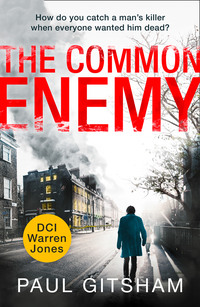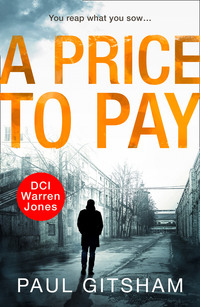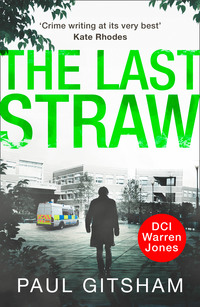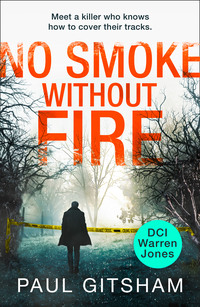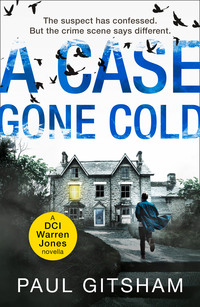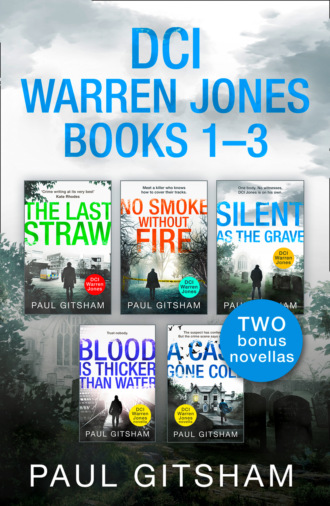
Полная версия
The DCI Warren Jones Series Books 1–3
“Well, don’t forget the table’s booked for six-thirty and the show starts at eight. And I suggest that you bring some sort of peace offering.” Whether it was for Susan or her mother wasn’t clear. Warren decided he would play it safe and get something for both of them.
Hanging up, he turned to see Sutton grinning, clearly having heard at least part of the call.
“Mother-in-law’s birthday,” Jones offered weakly by way of an explanation.
Remarkably, Sutton’s expression changed to one of sympathy.
Given the strained relationship between them, Jones decided to take advantage of this slight wind change and attempt to build some common ground.
“Do you have the pleasure of a mother-in-law, Tony?” It was a weak opener, nevertheless Sutton seemed willing to run with it.
“I have two.”
“Two? How the hell does that work?” Jones grimaced. Maybe he should cut the man some slack, he thought — it must be a tough life with two of them.
Sutton let out a bark of laughter. “Badly!”
Jones said nothing, simply smiling in sympathy. Sutton accepted the implied invitation. “My current wife has a mother who is very much alive and kicking…mostly kicking. She’s never really liked me and isn’t very good at hiding it. Sometimes I think she watched a little too much Les Dawson and decided that’s what mother-in-laws were supposed to be like.”
Jones chuckled. “Now, take my mother-in-law. No, please, take my mother-in-law,” he intoned in a fair interpretation of the comic’s rich, northern baritone. Sutton smiled in acknowledgement of Jones’ attempt at levity.
“Mother-in-law number one, Betty, is also still on the scene. She doesn’t like me very much either.”
Jones raised an eyebrow in surprise at the intricacies of Sutton’s personal life.
Sutton shrugged. “Long story, short — Angela and I got married far too young. Everybody said it wouldn’t work, but we were young, stubborn and in love.” He smiled wistfully. “Anyway we did our best for five, six years but it was hard work. I was a young copper on a constable’s pay; Angela worked shifts at the local hospital. We rarely saw each other and when we did, we never had any money to enjoy ourselves. So we did what hundreds of foolish young couples have done before us and decided to have a baby to bring us together.”
“And did it?”
Sutton snorted. “What do you think? At first it was great. Angela had a pretty good pregnancy and we were both thrilled when Josh was born. The excitement lasted a year or so, until Angela went back to work. Then it was as if the clock had turned back twelve months. We both still worked shifts, so we still hardly saw each other and when we did we could never have any time alone because Josh was there.
“Fortunately, Betty and her husband Doug lived nearby and loved Josh to bits, so they would babysit whilst we went out.” Sutton’s expression turned thoughtful. “You know, in many ways, although she didn’t like me very much, I really think Betty wanted me and Angela to succeed. The problem was, we were both feeling hemmed in. Angela wanted to go back to college to study for her nursing degree. I wanted to go to night classes and do a degree before studying for my sergeant’s exam, but that was no longer possible. So we carried on as we were for another year or two, before I fucked up. Big time.”
“What happened?” Warren asked cautiously. Sutton’s candour was unexpected and he didn’t want to kill the moment.
“It was such a bloody cliché. I got absolutely hammered at the nick’s Christmas party and woke up the next morning in bed with one of the civilian office workers. Needless to say, when I finally slunk home, Angela was furious. I didn’t try to deny it. There was no point — it was bleeding obvious what had happened. I packed my bags, left the house and kipped on a mate’s floor.
“That could have been the end of it. Angela kicked me out, fair play, and I’m sure Betty and Doug were happy to tell her ‘I told you so’, but there was still the issue of Josh. Angela never wanted to see me again, unsurprisingly, but amazingly Betty stood up for me. By now Angela was back with her parents and Betty basically said, ‘My house, my rules. Josh needs his dad and I’m not letting him get off scot-free.’ I think at first she was worried that I’d just piss off and leave them.
“As it happened, I was terrified that it would all have to go to court and I’d end up taking Josh to McDonald’s once a month if I was lucky. Anyway, she turned up at the bedsit I was renting and said in no uncertain terms that I was a shit husband but a good father and that a boy needs his dad. So that was that.” He shook his head slightly, as if he still couldn’t quite believe his own memory.
“Josh stayed with his mum and Betty and Doug helped her look after him whilst she went back to college. I started night school and with a little help from my own mum and dad managed to afford the rent on a two-bedroom flat so Josh could stay over. I saw him most weekends, and when he got a bit older and started going to school, Betty used to insist that Angela and I co-ordinate our shifts so that when Angela was on nights he could stay with me and I’d take him to school.
“Anyway, he’s seventeen now, starting to think about university. He’s always got on well with my second wife, Marie, and he probably spends as much time at mine as his mum’s. He has his own room in our house and he’s only a ten-minute walk from Angela’s so he often turns up in the evening to watch the footie with me on Sky. Angela and I still aren’t the closest of friends, but we both go to parents’ evening and any reports from school are sent around to me as well.”
Sutton shook his head again, as if in wonderment or disbelief. “It’s amazing. Betty still doesn’t like me very much, yet without her I’d be like half the fathers in this nick, barely seeing their kids and constantly going to court over broken access orders.”
Jones was at a loss for words. Sutton had just shared a clearly intimate part of his life with him. Maybe the two of them could work together.
“You make me feel guilty for all the wicked thoughts I’ve been having about my own mother-in-law, Tony. I’ll make sure I get an extra big bunch of flowers when I see her tonight.”
Sutton grinned, then turned sober. “Well, sir, may I suggest that we crack on, then? Sooner we’re done, sooner you can find a garage with a cut-price deal on daffodils.”
Chapter 8
As Sutton headed back to the canteen to round up the rest of the team Warren unwrapped the cling film from his cheese and tomato sandwich. He carefully peeled back the top slice of bread and plucked the sorry-looking slices of tomato from on top of the micron-thin layer of Cheddar resting on a much thicker layer of margarine. The tomato’s juice had soaked the top layer of bread, making it soggy. Carefully wrapping the tomato in the cling film, he deposited it in a nearby waste basket. Why couldn’t a man just get a plain cheese sandwich? Biting into the sandwich, he grimaced. Where it wasn’t soaked with tomato juice, the starchy white bread was dry, verging on stale, and the cheese was indistinguishable in flavour from the margarine. One bite was enough, he decided, and the remains joined the tomato and cling film in the bin.
Rejoining Hardwick and Sutton in the briefing room, he saw that a number of other detectives had also returned to the station. There was a low buzz of conversation. Kent, he saw, had started making use of the whiteboards, summarising the information flowing in from the investigators. Doing his best to ignore the faint, tantalising smell of somebody’s microwaved ready meal — clearly somebody better prepared than he to work on a Saturday — Jones called the meeting to order.
By agreement, it was decided to leave Spencer and Severino until last, to see if anything else came out of the mix before they narrowed the investigation prematurely. Starting with DS Kent, he asked the man to fill everybody in on what information had been acquired so far.
First of all, the house-to-house inquiries at the few residential properties nearby had resulted in no leads; no strange noises or suspicious strangers hanging around during the time of the murder or in the hours preceding it. Similarly, as expected, none of the local businesses had CCTV that overlooked the university building. The traffic cameras along the roads adjacent to the department were also useless, focused as they were on the roads and a nearby junction rather than the building itself. It looked as though between the university’s CCTV blind spots and the patchy traffic camera coverage in the area, it would be quite possible to approach the building and enter it on foot undetected.
Turning to the call-centre logs that night, no reports had surfaced as yet of any crimes taking place within a mile or so of the Biology building. Overall it had been a fairly quiet Friday night with no more than the usual amount of closing-time fisticuffs, drunken vandalism and domestic violence.
Dr Crawley and the university’s Personnel and Student Services departments had been helpful in supplying the names and details of the laboratory’s various workers and students, including the undergraduate student, Clara Hemmingway, that Tunbridge had his alleged affair with. A list had been drawn up on one of the whiteboards, headed ‘Potential Suspects’ with additional columns such as ‘Motive?’ and ‘Alibi?’. Jones had a feeling that before the day was out, a second board might be needed.
On a different whiteboard, a second list had been drawn up headed ‘Witnesses’. The two students that Tom Spencer claimed to have spoken to immediately before locking himself in the PCR room were named. Officers were on their way to interview them to check that they corroborated his story. A third whiteboard was simply labelled ‘Forensics’. This was blank at the moment.
Now it was Jones’ turn. Quickly, he summarised the interviews with Crawley and Tompkinson, adding a few more names to the suspects board. With that done, he moved on to Spencer. With the swipe-card logs from the PCR room and main-building entrance and assuming that the two students corroborated his story, Sutton proposed that they interview him one last time then eliminate him.
Jones shook his head. “Let’s not be too hasty. We don’t know that Severino didn’t have an accomplice and he was the only other person in the building at the time. Something doesn’t feel right about him.”
Sutton grunted non-committally. Ignoring him, Jones pressed on. “Spencer aside, number one suspect at the moment is Dr Antonio Severino, an Italian postdoctoral researcher in Tunbridge’s group. It seems that Tunbridge shafted him big time a few weeks ago and by all accounts he left in a furious if not murderous mood. We’re doing background checks on him now. CCTV has an unidentified male entering then exiting the building within the timeframe consistent with the murder. The building’s swipe-card logs suggest that the suspect used Severino’s access card. We arrested him an hour ago at his house. Unfortunately he seemed to have been having a one-man party last night and is busy sleeping it off in the drunk tank. We’ve a brief and a translator standing by for when he rejoins the land of the coherent. In the meantime, Forensics are searching his house and looking for trace evidence.”
Jones looked around the room. “Anything else to add? Any more questions?”
“Have we confirmed the wife’s alibi yet?”
Kent answered this. “We’ve tracked down a couple of her dinner companions and the duty manager from the restaurant last night claims to have remembered the party. Till receipts match her credit card number. We’re waiting on CCTV from the restaurant, but it looks as if she’s cast iron at the moment.”
Another hand. “Have we got any more forensics yet? What about the post-mortem?”
“Full results from the PM are promised by tomorrow evening. Preliminary forensics are consistent with what we had this morning. We can expect a full report from the unit at Welwyn tomorrow. No word as yet from Severino’s place. A computer forensics team from Welwyn will be looking at Tunbridge’s laptop, to see if there are any clues there, particularly as to why he was working alone on a Friday night.”
No more hands were raised, so Jones decided to assign roles to those present and close the meeting.
Calling Sutton over, he outlined his plans. Severino wouldn’t be fit for interview for a few more hours, so they had time to re-interview Spencer, who had just arrived at Reception. Jones was also keen to speak to the late professor’s one-time mistress, Clara Hemmingway. A couple of uniforms were dispatched to her student flat to bring her in for questioning.

Making their way down to the station’s number one interview room, Jones arranged for the desk sergeant to fetch Spencer. Moments later, the young man shuffled in. Dressed in a clean T-shirt and neatly pressed chinos, he was a far cry from the paper-suited, blood-stained mess from the night before. Escorting him was a middle-aged black woman in a smart, pinstriped suit carrying a briefcase. She introduced herself as Denise Jawando, his solicitor. Although he wasn’t under arrest, Spencer’s parents had insisted on her presence as a precaution. Jones noted that her handshake was perfunctory, her expression unsmiling.
As soon as all were seated, the recorders running and the appropriate introductions made for the tape, Jawando launched in.
“May I remind you, Chief Inspector, that my client is here voluntarily as the witness to a crime in which he played no part and that he is not under arrest?”
Smiling tightly, Jones kept an even tone. “Thank you for your assistance. Mr Spencer, for the record, could you tell us again what happened last night?”
All eyes turned towards the young researcher. Fresh clothes notwithstanding, he looked dreadful; it had been barely twelve hours since he had found the body, yet he looked as if in that time he had lost a week’s worth of sleep. He was of average height and build, his hair a dirty blond, its length midway between scruffy and fashionably long. A few days’ stubble darkened his jowls.
“I was working late, trying to finish off some PCR reactions before going home. I went down to the PCR room on the ground floor about nine.” The student had a broad Manchester accent, although his diction was precise and absent the urban drawl possessed by many native Mancunians.
“Can anyone confirm that?”
“Like I said last night, I said ‘Hi’ to a couple of Stanley Westlake’s lab who work near there, Chloe and Steven. They were going to the Hogshead for a pint. I said I’d try to join them in an hour or so, but not to wait for me in case I was late.
“I was in the PCR room for an hour or so — you can check that, because it has a swipe-card lock — before going back up to the lab.”
“What were you wearing?” interrupted Sutton.
“What you found me in: jeans, T-shirt and a lab coat, with latex gloves.”
“When did you leave the PCR room?”
“About quarter-past ten, I guess.”
“Did anyone see you then?”
“No, I don’t think anyone was left in the building by that time, but again the swipe machine should confirm my exit.”
“Where did you go next?”
“Nowhere, I went straight back to the lab. I put the completed PCR reactions in the freezer. I’d seen Alan’s office light was on when I came back up, so I decided to pop my head around and say ‘Goodnight’. That’s when I saw the body.”
“You were still wearing latex gloves, a lab coat and a face mask when we arrived. Seems a little strange that you didn’t take these off if you were going to say ‘Hi’ to the boss.”
Spencer shrugged vaguely. “I dress like that all day, every day. I probably just forgot.”
“Tell me what happened then, Tom.”
Spencer’s eyes became downcast. “The moment I came in, I saw the blood. He was spun in his chair staring towards the doorway. I could see from the state of his throat that he had to be dead, but I checked for a pulse anyway. Then I dialled 999.”
Jones nodded in understanding. “May I ask why you didn’t use your mobile phone to call us? You young people seem to have them turned on constantly these days. I wouldn’t have thought many people your age could use a landline.” Despite his almost light-hearted tone, the question was a serious one. For Spencer’s generation, the mobile phone was like an extension of their body. Office phones and other semi-obsolete equipment were almost invisible to them. Spencer had an expensive smartphone in his pocket when he was arrested, indicating that he wasn’t a total Luddite.
“I saw a picture of one on the Internet and used Wikipedia to tell me how to use it,” responded Spencer with an almost straight face. Warren smiled briefly in response, before becoming sober once more.
“Tell me, Tom, how much did you hate Professor Tunbridge for stopping you passing your PhD?”
The question was deliberately brutal and out of the blue; Jones wanted to see what Spencer’s response would be. He blinked a few times, as if trying to understand the question. “Alan and I had our differences, sure, but I’d never dream of killing him.”
Jones and Sutton said nothing, waiting. The silence stretched uncomfortably. Eventually, Spencer broke it, as they knew he would. “Anyway, I have done pretty much everything I need. I’d be mad to kill Alan — I needed him to sign off on everything.” Jones and Sutton said nothing, apparently ignoring the contradiction with everything that they’d found out that morning.
“I was just doing a few more experiments, before I wrote up the final conclusion.”
Now it was Jawando who broke the silence. “I think we’ve heard enough, gentlemen. My client has a provable alibi. He was merely in the wrong place at the wrong time.” At that moment, there came a knock at the door.
Sutton answered it, stepping into the corridor. After a few moments he returned and whispered into Jones’ ear, who nodded, then addressed Spencer.
“We’ve just got confirmation from the two graduate students that you saw on your way to the PCR room. Along with the security logs showing swipe-card usage, it seems that your alibi stands up. I think that’s enough for today. We may need to contact you again in the future, however, to answer further questions.”
Spencer slumped back into his chair in obvious relief. Jones arranged to have his statement typed up and signed, before seeing him to the front door.
When Spencer was finally gone, Jones called into the custody suite to check on Severino. The Italian was snoring loudly on the small bed. A half-filled bucket next to him and the stains down the front of his paper suit justified the police surgeon’s recommendation that they wait another hour or two before attempting to interview him.
In the meantime, Jones decided to see what the professor’s former lover had to say for herself. Whilst they waited for Hemmingway to arrive, Jones polled Sutton for his thoughts. “Well, I think we can rule out Spencer and I reckon this Severino character is good for it. We need to tie up a few loose ends, but it looks pretty open and shut to me. The super will be pleased — twenty-four hours to solve a murder investigation is pretty good.”
“Well, let’s not count our chickens before they’ve hatched. I think there is still a lot more to this than meets the eye.”
“In what way?”
“Well, first of all, even if Severino did do it, was he working alone?”
“We’ll have to see what he says, I suppose, but, even if there are others involved, the evidence so far suggests that he committed the murder alone.”
“But what evidence? That CCTV image is pretty non-conclusive and anyone could have swiped his access card through that lock. Furthermore, how did he know that Tunbridge would be working late that night? Was that usual for him? If not, who tipped Severino off? And what about Spencer? Something’s not right there.”
“Well, it looks like it’s as his brief said — wrong place, wrong time.”
“Possibly, but something smells strange about this set-up. It’s too bloody convenient. He just happens to be in the PCR room when it all goes down and then he stumbles across the body. He checks the pulse of a blatantly dead man, conveniently covering himself in the victim’s blood to wreck any forensics. Why did he check the carotids? Don’t most people check the wrist for a pulse? And his demeanour wasn’t right. He’s just found a freshly murdered co-worker, whilst on his own in a large, deserted building late at night. Chances are the killer is still in the building somewhere, yet he calmly makes a phone call and waits at the murder-scene for us to arrive. I don’t know about you Tony, but I’ve seen enough slasher movies in my time to know that you don’t hang around and call the police from the victim’s phone, you run like hell and find somewhere to hide before using your mobile.”
Sutton shrugged, clearly not convinced.
“I think you’re over-complicating things, guv. Shock makes people do strange things.”
Seeing that he was unlikely to budge his colleague based on what they had so far, Jones decided to give up. In the meantime, the desk sergeant was signalling that Clara Hemmingway had arrived. Motioning to Sutton, they headed for Interview Room Two to avoid contaminating Hemmingway with any trace evidence from Spencer’s interview in Interview One. More than one case had been scuppered because the police had transported two different suspects in the same car or interviewed them in the same room and found it impossible afterwards to disentangle their separate DNA profiles.
Gathering his thoughts, Warren prepared for his next interview of the day.
Chapter 9
A uniformed constable led Hemmingway into the interview room. She was a youngish-looking twenty-year-old in jeans and a crop top with a slim figure, generous cleavage and carefully styled short blonde hair; it was easy to see why a middle-aged university professor might have been tempted. Taking a seat opposite the two detectives, she placed her large black handbag on the floor next to her. Jones introduced himself and Sutton for the benefit of the recording, before explaining that she was not under arrest, nor had she been charged with any crime. She nodded, looking curious but not overly nervous. Jones glanced at the slim file in front of him. Two police cautions in her early teens for shoplifting and a suspended sentence, aged seventeen, for her part in a drunken brawl in Colchester town centre on a Saturday night. Miss Hemmingway had certainly been through this process before, he noted.
Nevertheless, she’d clearly cleaned up her act sufficiently to pass her A levels and convince the admissions tutor that she was worthy of a place at university. The University of Middle England might not be Oxford or Cambridge, but with the current demand for places they could afford to pick and choose who they offered those places to. He’d have to remember that. This young lady was clearly a little more intelligent than the stereotypes might suggest.
Watching her carefully, Jones started, “Now, the reason we have asked you down here is to help us with our enquiries regarding the murder of Professor Alan Tunbridge last night. How well did you know the professor?”
Hemmingway’s eyes widened slightly. “Murdered? Why? Where?”
“He was found in his office last night. He’d been stabbed.” Jones decided not to give out too much information at this stage. “Again, how well did you know the deceased?”
Hemingway paused for a couple of seconds. “Well enough, I suppose. I did a bacterial genetics module with him last year.”
The answer was terse, short and cautious. Jones and Hemmingway locked eyes. She wasn’t stupid. She knew that the only logical reason that she was here was because the police were aware of at least some of her past history with the murder victim. Nevertheless the wariness forged by years of playing so close to the thin blue line had conditioned her not to give away anything more than absolutely necessary.


